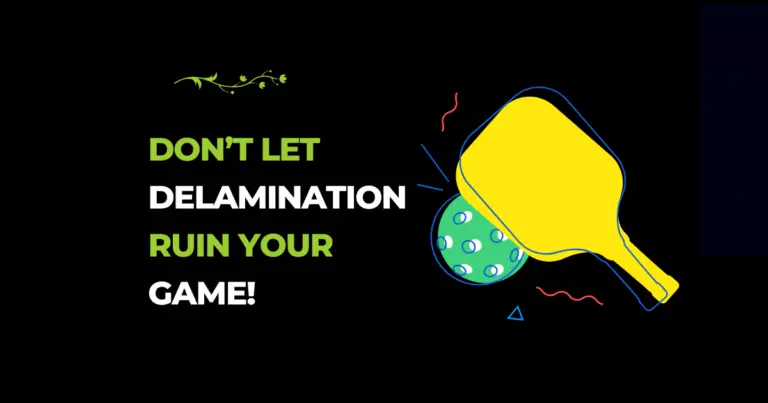Last updated on: September 21, 2023
When it comes to pickleball paddles, weight matters! Finding the right balance is key to having a great game. Too heavy and you’ll be swinging that paddle like it’s a brick! Too light and you won’t generate enough power on your shots. 😬 So what’s the golden ratio? 🤔 Well, keep reading as I break down the best weight for your new pickleball paddle! From pros and cons to ideal weights for beginners vs. advanced players, I covered all the info you need before you pick up that new paddle. So join me on this bouncing journey through the world of pickleball paddle weights – it’ll be a smashing good time! 😜
How Does Paddle Weight Affect Your Game?
The weight of your paddle affects several aspects of your pickleball game:
Power
A heavier paddle can generate more power on shots like serves and smashes due to increased momentum. The extra weight provides more put-away capability.
Control
A lighter weight gives you more maneuverability and control for finesse shots like dinks and drop shots. It’s easier to make slight adjustments.
Comfort
Over the course of a long match or tournament, a heavy paddle can fatigue your arm faster than a lightweight option. Consider your strength and fitness level.
Wrist/Elbow Health
An overweight paddle strains your joints over time, increasing injury risk to your wrist, elbow or shoulder. Lighter is healthier, especially for seniors.
Quickness
Faster reaction time comes more naturally with a lighter paddle. Quicker movement means you can get to more shots.
As you can see, the ideal pickleball paddle weight depends heavily on your age, skill level, game style, and strength. Keep reading to find the best weight for YOU.
Pickleball Paddle Weight Regulations
According to the USA Pickleball Association rule book, legal paddle weights must follow these parameters:
- Minimum weight: 6 ounces
- Maximum weight: 17 ounces
- At least one inch apart from the paddle edge to the weight port
The most common pickleball paddle weights currently on the market range from 7.2 ounces to 8.8 ounces. Heavier and lighter paddles exist, but remain less popular.
What Is The Average Pickleball Paddle Weight?
- The average recreational pickleball paddle weight is around 7.8 ounces. However, heavier paddles around 8.3 ounces are common too.
- Lighter paddles under 7.5 ounces are usually preferred by smaller, younger players and seniors.
- Heavier paddles over 8.5 ounces tend to be used by strong, competitive players who hit forceful shots.
Again, the “ideal” pickleball paddle weight depends entirely on your needs and play style. The average can vary.
Factors That Affect Ideal Pickleball Paddle Weight
Here are key considerations when choosing the right pickleball paddle weight:
Age
- Seniors and younger players often prefer very lightweight paddles under 7.5 oz due to less strength and more injuries.
- Adults in their 30s-50s typically use mid-weight paddles around 7.5-8.2 oz.
- Strong players over 50 can still use heavier paddles over 8 oz successfully.
Recommended Pickleball Paddle Weights by Age
| Age Range | Ideal Weight Range |
| Under 12 | 6.8-7.4 oz |
| Teens | 7.0-7.6 oz |
| 20s-30s | 7.5-8.0 oz |
| 40s-50s | 7.8-8.3 oz |
| 60s-70s | 7.0-7.6 oz |
| 80+ | 6.8-7.2 oz |
Strength
- If you have less arm strength, shoulder mobility or wrist problems, sticks with lightweight paddles under 7.8 oz.
- Bigger, stronger players can manage heavier paddles 8 oz and up without fatiguing as quickly.
Skill Level
- Beginners do better with lighter control paddles around 7.3-7.7 oz as they develop proper form.
- Intermediate players tend to use mid-weight paddles around 7.8-8.2 oz for decent power and control.
- Advanced and pro players can wield heavier power paddles 8.3 oz+ to hit vicious shots.
Pickleball Paddle Weights by Skill Level
| Skill Level | Typical Weight Range |
| Beginner | 7.2-7.6 oz |
| Intermediate | 7.6-8.0 oz |
| Advanced | 8.0-8.4 oz |
| Pro | Over 8.4 oz |
Game Style
Finesse players focusing on control and placement prefer lightweight paddles under 7.8 oz.
Aggressive hitters who blast shots favor heavier paddles 8 oz+ for maximum power.
Well-rounded all-court games allow mid-weight paddles around 7.8-8.2 oz.
Injuries
Those with wrist, elbow or shoulder injuries should use lightweight paddles below 7.5 oz to reduce strain.
Recommended Pickleball Paddle Weights By Category
Here are the ideal pickleball paddle weights based on your profile:
Seniors: 7.0-7.5 ounces
Seniors need lighter paddles to accommodate reduced strength and injury risks. Top choices:
- Selkirk Amped S2: 7.3 oz
- Onix Graphite Z5: 7.2 oz
- Gamma Micronite: 7.0 oz
Juniors: 6.8-7.5 ounces
Young beginners have better control with lightweight paddles. Recommended models:
- Head Extreme: 7.1 oz
- Pickleball Central Starter: 7.2 oz
- Gamma Voltage: 7.0 oz
Women: 7.2-7.8 ounces
Many women prefer mid-weight paddles for good balance. Great options:
- Selkirk Amped Epic: 7.8 oz
- Onix Graphite Z5: 7.2 oz
- Paddletek Bantam EX-L: 7.5 oz
Men: 7.8-8.3 ounces
Most men can handle heavier paddles with their strength. Powerful picks:
- Selkirk Amped Invikta: 8.1 oz
- Onix Graphite Z5: 7.2 oz
- Engage Poach Advantage: 8.3 oz
Pros & Advanced Players: Over 8.0 ounces
Elite players wield very heavy paddles for maximum pop. Top pro picks:
- Selkirk Amped S2 Max: 8.7 oz
- Prolite Crush PowerSpin: 8.2 oz
- Franklin X-40 Power: 8.3 oz
How To Find The Right Pickleball Paddle Weight
If you’re unsure what pickleball paddle weight is optimal for your needs, follow these steps:
1. Start lighter as a beginner
Novices learning proper form prevent injuries and build skills faster with lightweight paddles around 7.3 oz.
2. Add weight as you improve
As you advance, increase paddle weight in 0.2-0.5 oz increments to find your ideal range.
3. Demo different weights
Local retailers and manufacturers often let you demo paddles. Test a few different weights in live play.
4. Consider custom paddles
Some companies like Selkirk and Paddletek offer custom paddle weights tailored to your specs.
5. Evaluate after play sessions
After using a paddle, evaluate if the weight caused any hand or arm discomfort due to excessive heaviness.
6. Talk to your pro coach
Experienced coaches can watch your swing and suggest an optimal paddle weight range for your game style.
Lighter vs. Heavier Pickleball Paddles
| Lighter Paddles | Heavier Paddles |
| Better control | More power |
| Quick reaction time | Added pop on shots |
| Reduce arm fatigue | Momentum generates pace |
| Prevent wrist/elbow injuries | Drive deep returns |
| Preferred for finesse | Ideal for aggressive hitters |
| Easier to maneuver | Extra weight powers serves |
Pros and Cons of Pickleball Paddle Weights
| Pros of Lightweight Paddles | Cons of Lightweight Paddles |
| Increased touch and finesse | Less power and pop |
| Quick movements and reactions | Struggle against hard hitters |
| Reduced arm/wrist strain | Not as smashing serves and returns |
| Easier to control placement | Can be hard to block power shots |
| Better for beginners and seniors | Advanced players may want more heft |
| Pros of Heavyweight Paddles | Cons of Heavyweight Paddles |
| Max power on shots | Quick maneuverability reduced |
| Vicious serves and smashes | Less finesse and touch |
| Plow through opponent’s shots | Arm and wrist fatigue |
| Drive deep returns | Tough for beginners to control |
| Preferred by elite players | Increased injury risk |
Does Pickleball Paddle Weight Really Matter?
Is a few extra ounces really that significant? Yes, pickleball paddle weight has an impact on performance and enjoyment. Too light and you sacrifice power. Too heavy leads to fatigue and injury. The right weight provides a blend of touch, pop, and maneuverability.
How To Add Weight To A Pickleball Paddle
If your paddle is too light, you can add weight by:
- Installing heavier grip tape
- Inserting lead tape strips
- Using a weight kit from the manufacturer
- Filling empty weight ports with sand or lead pellets
Just ensure any additions are regulation-compliant and evenly balanced.
How To Remove Weight From A Pickleball Paddle
If your paddle is too heavy, you can remove weight by:
- Using lighter grip tape
- Taking out unnecessary weight inserts
- Drilling extra holes in the paddle face or edge
- Sanding down the handle or neck
Be careful not to alter the paddle too much which ruins performance or makes it illegal.

Frequently Asked Questions (FAQ) About Pickleball Paddle Weight
What pickleball paddle weight is best for control?
Lighter pickleball paddles around 7.2-7.6 oz provide the best finesse and control for delicate touch shots.
What pickleball paddle weight is best for power?
Heavier paddles from 8.2-8.8 oz generate the most power and pop on smashes and serves.
What pickleball paddle weight do professionals use?
Most pro and elite players use paddles with weights over 8.0 oz, often 8.2-8.7 oz for maximum shot velocity.
What pickleball paddle weight is best for beginners?
Novices under 7.5 oz allows beginners to develop proper form and reduce arm strain while learning.
What pickleball paddle weight is best for seniors?
Seniors and older players benefit most from ultra lightweight paddles around 7.0-7.4 oz due to less arm strength.
What pickleball paddle weight is best for kids?
Children and younger players need lighter youth paddles typically 6.8-7.4 oz as their muscles are still developing.
Can you play competitively with a lightweight paddle?
Yes, some pro players use lightweight paddles around 7.6-7.8 oz effectively, but they require perfect form and efficient strokes.
Does paddle weight really make a noticeable difference?
Absolutely, paddle weight has a great impact on power, control, quickness, and fatigue over long matches.
Can you add weight to any pickleball paddle?
Technically yes, but altering some composites like aluminum or aramid honeycomb cores excessively can damage the paddle or void the warranty.
The Bottom Line: Choose Your Pickleball Paddle Weight Wisely
Finding your bestl pickleball paddle weight can polish your skills and prevent injuries. While the average weight is around 7.8 oz, consider your age, strength, ability, and game style. Test different weights when possible. Lighter paddles provide control for finesse players, while heavier options supply power. Most importantly, make sure you can swing the paddle comfortably without straining. A few ounces makes a big difference, so choose your pickleball paddle weight wisely!








One Comment